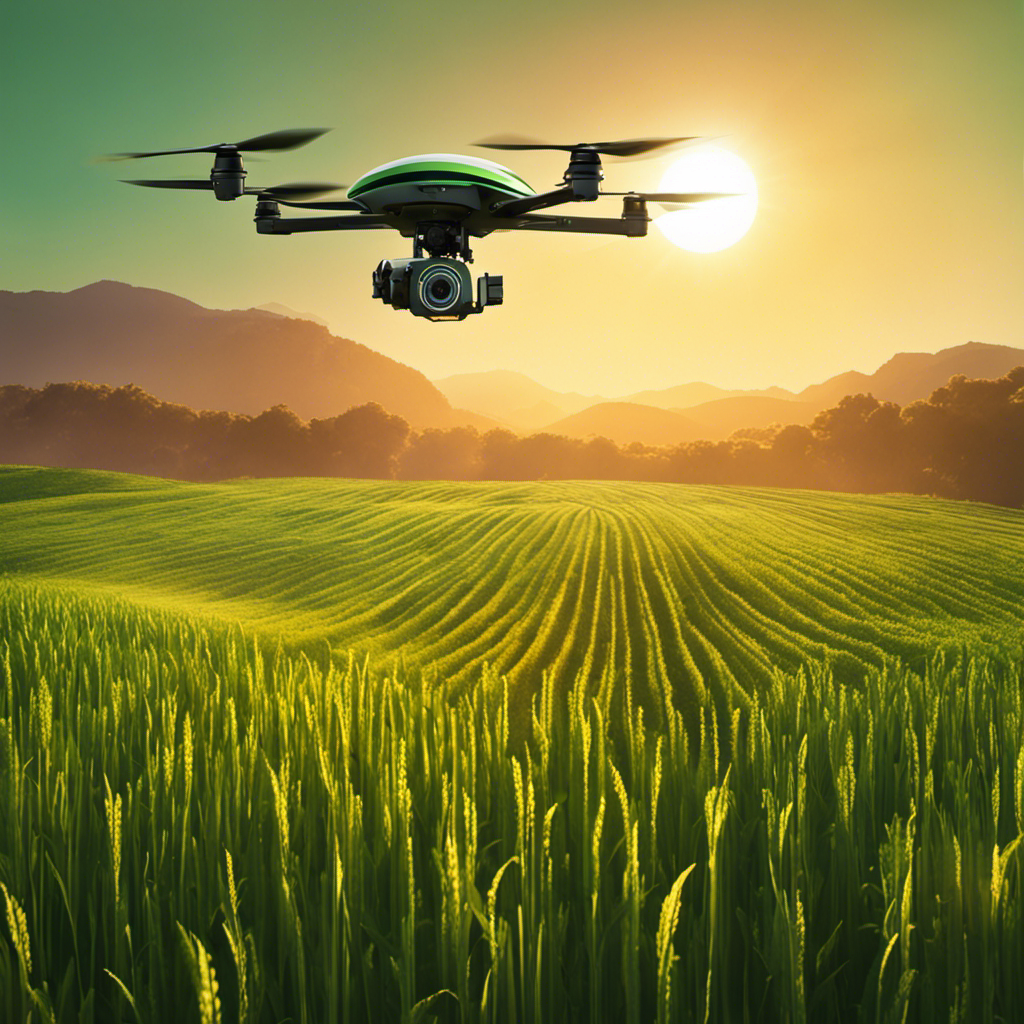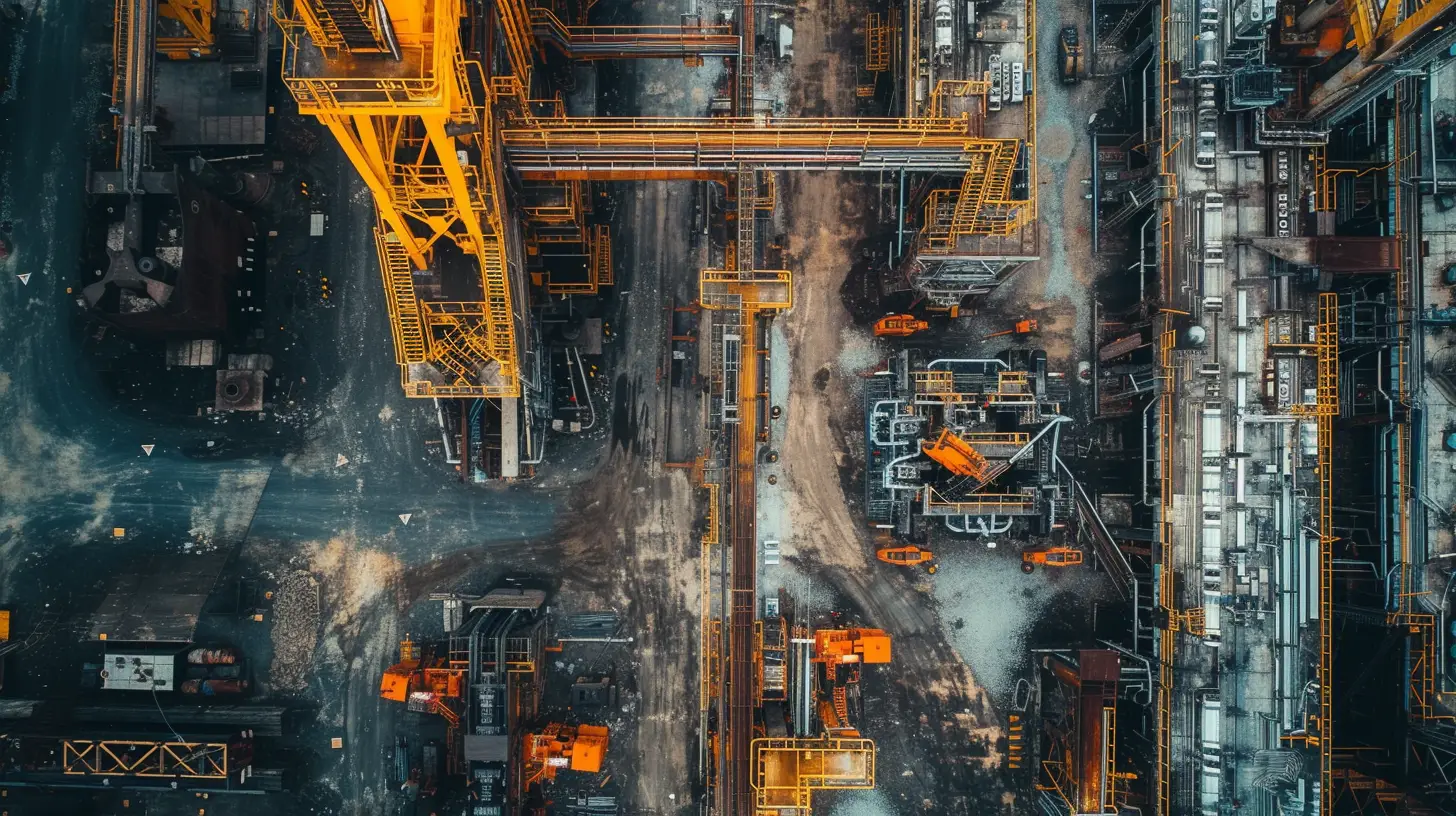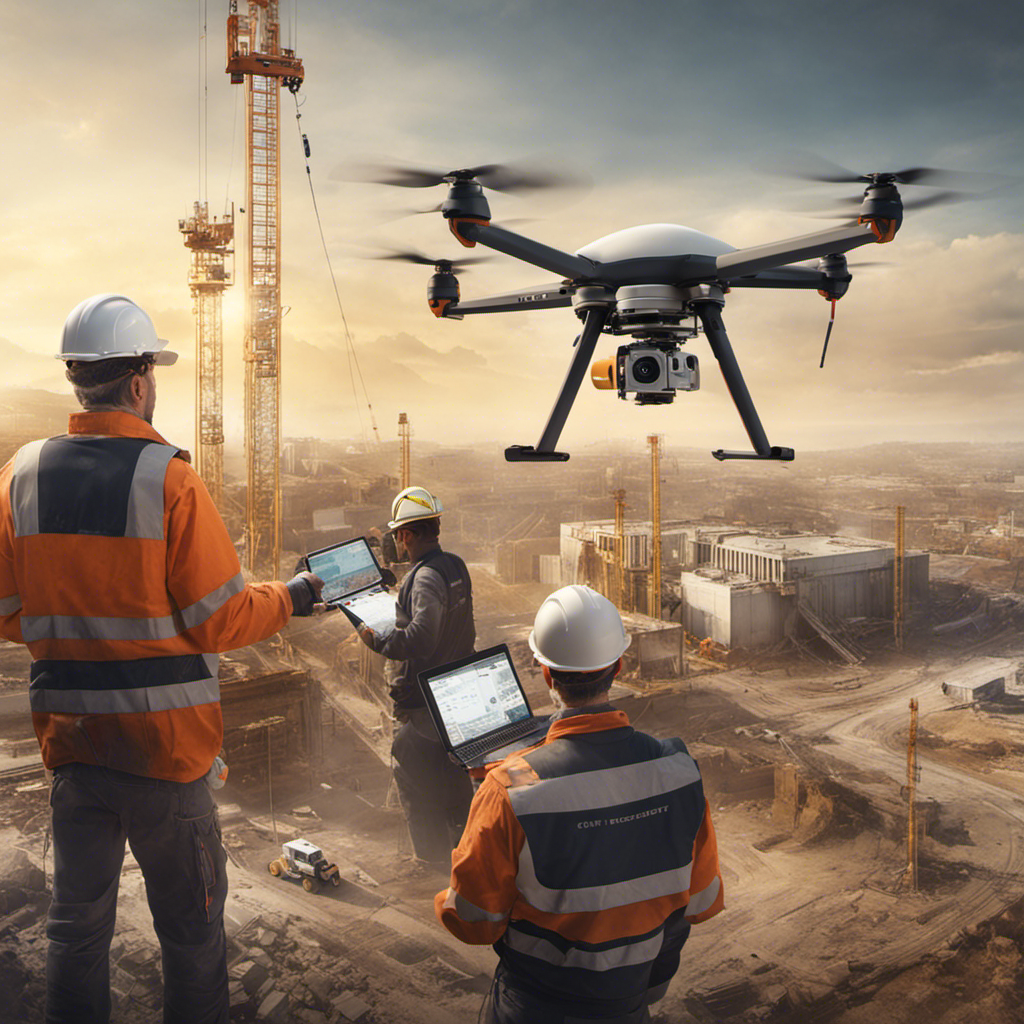Imagine a world where the shackles of conventional farming practices are broken, where the skies are filled with drones, soaring above the fields and unlocking the potential of agriculture.
This is the future we envision, where drones become your trusted allies in cultivating the land. With their advanced capabilities and sensors, these aerial marvels have the power to revolutionize how we farm.
They can monitor crops, detect pests and diseases, and help you make informed decisions, all while reducing costs and environmental impact.
So, embrace the freedom that drones bring, as they unlock a new era of precision and efficiency in agriculture.
It’s time to unleash the true potential of drones and watch your fields flourish like never before.
Key Takeaways
- Drones provide precise and efficient solutions for crop monitoring, capturing detailed images of crops and soil conditions.
- Drones enable data-driven decision-making for increased productivity and minimize the need for manual labor in crop monitoring.
- Drones equipped with advanced sensors and imaging capabilities enhance precision agriculture, providing real-time, high-resolution data on crop health, irrigation, and soil fertility.
- Drones offer an efficient way to combat pests and diseases in farming, enabling targeted and precise pest management strategies and early detection of diseases for effective management.
The Role of Drones in Crop Monitoring
To effectively monitor your crops, drones provide a precise and efficient solution.
Agricultural drones, also known as unmanned aerial vehicles (UAVs), have the potential to revolutionize farming practices. With the advancement of technology, farmers now have access to real-time data on crop health and growth patterns. By capturing detailed images of crops and soil conditions, drones enable data-driven decision-making. This allows farmers to make informed choices, leading to increased productivity and optimized resource allocation.
The use of drones in crop monitoring also minimizes the need for manual labor and reduces the use of pesticides, resulting in a more sustainable and environmentally friendly approach to farming. With their ability to cover large areas efficiently and provide accurate data, drones play a crucial role in ensuring crop health and improving agricultural practices.
Enhancing Precision Agriculture With Drones
Maximize your farming efficiency with drones equipped with advanced sensors and imaging capabilities.
Enhancing precision agriculture with drones is revolutionizing the way farmers manage their crops and resources. Agricultural drones, with their technological advancements and data collecting capabilities, are empowering farmers to make informed decisions and adopt sustainable farming practices.
These drones provide real-time, high-resolution data on crop health, irrigation, and soil fertility, allowing farmers to identify and address issues more effectively. By monitoring plant health, drones can detect potential pest and disease areas, enabling farmers to take pre-emptive measures and reduce losses without relying on harmful pesticides.
Additionally, drones equipped with thermal imaging can efficiently monitor and manage livestock, ensuring safety, health, and improved efficiency in livestock management practices.
With their potential, drones are transforming precision agriculture and paving the way for a more sustainable and productive farming future.
Drones for Efficient Pest and Disease Management
Improve your pest and disease management in agriculture with the use of drones.
Drones offer a new and efficient way to combat pests and diseases in farming. By collecting data on plant health, drones can identify potential problem areas before they become widespread. This allows farmers to make informed decisions and take pre-emptive measures to minimize losses.
Drones also reduce the reliance on harmful pesticides by enabling targeted and precise pest management strategies. With the ability to monitor crops from above, farmers can detect signs of disease early on and implement effective disease management techniques.
By incorporating drone services into their farming practices, farmers can reap the benefits of improved crop yield and quality compared to traditional farming methods.
The future of pest and disease management in agriculture lies in the hands of drones.
Revolutionizing Livestock Monitoring With Drones
By equipping drones with thermal imaging, you can efficiently track and monitor your livestock, ensuring their safety and health. The integration of drones in livestock monitoring has the potential to transform the way farmers manage their herds.
Drones equipped with thermal imaging provide real-time data on the location and well-being of your livestock, enabling farmers to make informed decisions and take immediate action when necessary. These drones enhance the efficiency of livestock management by covering large areas quickly, reducing labor, and improving herding practices.
Additionally, drones equipped with lasers can deter predators, such as wolves or coyotes, while drones with heat-seeking technology can spot and neutralize venomous snakes.
The revolutionizing livestock monitoring with drones unlocks the full potential of precision agriculture and empowers farmers with the tools they need to ensure the safety and health of their livestock.
Future Trends in Drone Technology for Agriculture
To explore the future trends in drone technology for agriculture, let’s delve deeper into the potential applications and advancements that can further revolutionize farming practices.
As technology advances, drones equipped with advanced AI algorithms and GPS systems can unlock the full potential of agriculture. The benefits of drones in farming are immense, ranging from optimizing crop growth to improving livestock management.
With the utilization of drones, farmers can take advantage of precise data collection and analysis, allowing them to make informed decisions for optimal growth. In addition, drones can assist in weed control, reducing chemical dependency and minimizing harm to non-target plants and water sources.
Furthermore, drones equipped with AI algorithms can guide herds, enhancing herding efficiency and reducing livestock loss. However, to fully realize the future of agriculture, regulatory frameworks need to be more flexible to support the integration of drone technology on farms.
Frequently Asked Questions
What Are the Potential of Drone Technology in Agriculture?
Drones in agriculture have the potential to revolutionize precision farming, crop monitoring, pest control, irrigation management, livestock monitoring, yield prediction, soil analysis, plant health assessment, weed detection, and crop spraying.
How Are Drones Are Currently Being Used in Agriculture?
Drones are currently being used in agriculture for crop monitoring, pest control, irrigation management, precision spraying, soil analysis, livestock monitoring, plant health assessment, yield estimation, harvesting assistance, and crop mapping. They offer efficient and precise solutions to improve farming practices.
How Will the Increased Use of Drones Change the Jobs in Agriculture?
The increased use of drones in agriculture will automate tasks, improve precision farming, and lead to job displacement. Efficiency gains, data analysis, crop monitoring, and cost savings are expected, but new skill requirements and regulatory challenges may arise. Environmental benefits are also anticipated.
Do You Think Drones Are the Future of Farming?
Drones are undoubtedly the future of farming. With their ability to automate tasks, provide precision agriculture, monitor crops, control pests, manage irrigation, optimize yields, analyze soil, and minimize environmental impact, drones unlock farming’s potential.




